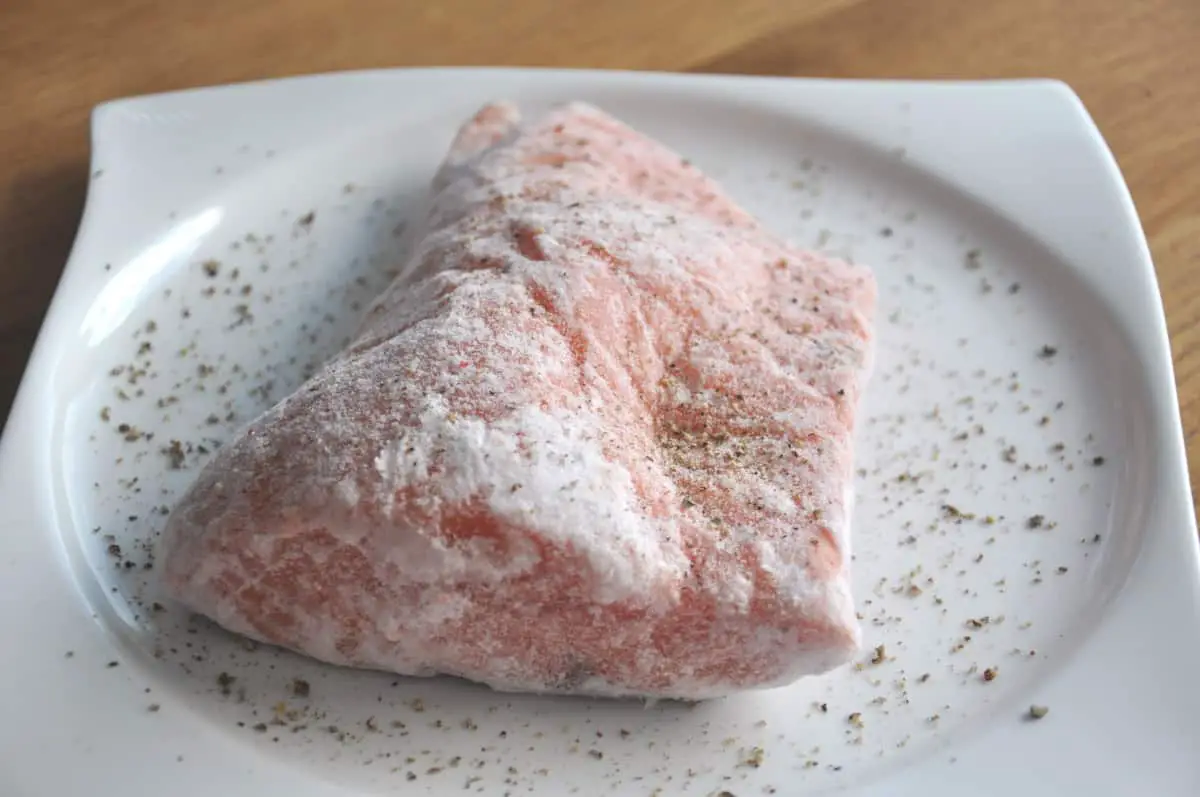Most people do not have access to fresh fish when cooking at home, and instead utilize the convenience of frozen fish. But when it comes to cooking frozen fish, the proper way to season it can be confusing. Can you marinate and dry rub the fish while it’s still frozen? Or do you have to let it completely thaw beforehand?
You can apply dry rub, season, even and marinate frozen fish before you defrost it. With that said, however, the taste and texture of the fish may be affected by not dethawing the meat before applying the seasoning.
Can you dry rub or season frozen fish?
Dry rub is a versatile way to flavor fish such as salmon and tuna, and is available in a seemingly endless array of spices of tastes. It can be used to season a wide array of fish, from lean to fatty fish. Applying dry rub or seasoning can be done using one of the four methods described below.
How do you dry rub or season frozen fish?
How to apply the dry rub is simple and only requires a few minutes. To do this, simply remove the frozen fish from the freezer, as well as from its packaging.
There are a few options you can use to apply dry rub:
- Apply oil before seasoning
- Rinse under water before seasoning
- Apply seasoning directly on frozen fish
- Slightly thaw the fish
Apply oil before seasoning
No matter what type of dry rub or season you use, make sure to cover the frozen fish in a layer of olive oil, grapeseed oil, or peanut oil before applying the seasoning.
Don’t let the oil drip off of fish; instead, make a very thin layer by tapping the oil onto a fish. If you put too much oil the seasoning will drip off.
The oil acts as a glue that is very much needed when dealing with frozen fish.
Rinse under water before seasoning
Another option is to rinse the frozen fish under cold water, removing any ice or frost on the surface.
You’re not trying to unthaw the fish, so rinse it just enough to remove the ice. Using a paper towel, pat the fish dry and then rub olive oil all over the surface of the fish.
Season the fish with dry rub or your favorite seasoning.
Apply seasoning directly on frozen fish
This is the least effective way to season frozen fish, but it will still work. Lean fish, such as tuna, and fatty fish, such as salmon, can all be seasoned with dry rub or your favorite seasoning, even if they are frozen. In fact, you can take the fish straight from the freezer and add the seasonings without first unthawing the fish.
Simply sprinkle the seasoning on fish, turn and apply the seasoning also on the other side.
Slightly thaw the fish
To use this method, you will need to take the fish out of the freezer and leave it for a few minutes on the countertop.
If you slightly thaw the fish, the upper layer of fish will become absorbent. The wet outer layer will hold the seasoning on the fish without falling off.
ESSENTIAL TOOLS AND EQUIPMENT FOR FREEZING FOOD
Last update on 2024-11-23 / Affiliate links / Images from Amazon Product Advertising API
Can you marinate frozen fish directly from the freezer?
It is possible to marinate frozen fish directly from the freezer before you defrost it. While it’s always best to let the fish thaw beforehand, marinating the frozen fish while it’s defrosting will still provide you with a tasty meal. Remember, however, that when cooking frozen fish, it will produce more steam than cooking a thawed fish, which can prevent the fish from obtaining a crisp skin.
How do you marinate frozen fish?
Marinating frozen fish is done in about the same manner as marinating thawed fish. Simply allow the fish to sit in the marinade for a certain amount of time. The marinade will seep into the fish, flavoring the meat while also adding moisture. To begin, simply prepare your preferred marinade in a bowl. Rinse the ice crystals off the frozen fish and then submerge the fish in the marinade. Place the submerged fish and marinade in the refrigerator and let soak for at least 30 minutes and up to 6 hours.
Does marinating, dry rubbing, or seasoning frozen fish affect the taste?
Every frozen fish releases some juices after thawing. It is better to discard these juices.
If you don’t they will slightly affect the taste. This taste will not prevail.
Stronger seasonings and marinades will overtake the taste of these juices. If you only apply salt and pepper, you might taste a slight “freezer taste”.
But the whole purpose of adding spices and sauces to frozen fish is to give the meat a different taste. In fact, it can help improve the overall taste of frozen fish. The whole purpose of marinades, dry rubs, and seasoning is to add flavor to our food.
Marinades soak into the fish, flavoring the entirety of the meat, while dry rub and seasoning flavors the outside of the fish. Marinades also help to keep the meat tender and moist. Keep that in mind when deciding which type of flavorings you should use to spice up your fish.
Is it better to defrost fish before dry rubbing, seasoning or marinating?
It is better to defrost the fish before adding any seasoning, dry rub, or marinade. In fact, it is recommended to allow the fish to thaw completely before cooking. This helps to reduce the chance of unappetizing textures, while improving the overall taste of the meat.
The best way to unthaw fish is to place it in the refrigerator overnight to allow it to thaw slowly. If you want to spread up the process, you can use the cold water method of dethawing. This will require placing the frozen fish in a ziplock bag, and then submerging the bag in cold water. You will need to change the water every 30 minutes until the fish has thawed.
Conclusion
Adding the seasonings, dry rub, or marinade while it’s defrosting can help you out in a pinch if you forgot to take the fish out of the freezer ahead of time. Keep in mind that this can reduce the overall taste and texture of the meat, but the fish will still be safe to consume.







